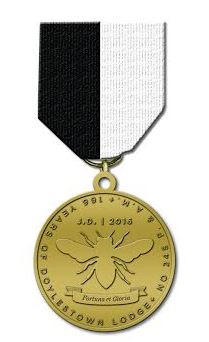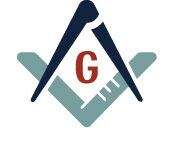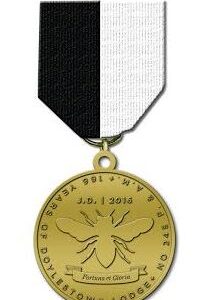The “Sword of State” is a large ceremonial sword carried before the Most Worshipful Grand Master at meetings of the United Grand Lodge of England (UGLE). Forged by Bro. George Moody, the King’s Sword-Cutler, the sword is four feet long, from the point of the blade to the crown of the hilt.
“The Grand Kibosh”
While we’re on the subject of clubs, we’re also going to look at the Independent International Order of Owls (no relation to the more popular Order of Owls, an animal-themed lodge akin to the Elks). Founded in 1890, the I.I.O.O was a Masonic-related group that promoted recreation and sociability among its members.
Read more““The Grand Kibosh””
Euclid’s 47th Problem
Also known as the Pythagorean Theorem, this equation (a2 + b2 = c2) is the building block of most mathematical problem solving. In basic form, it can tell you how to create a right angle, while advanced versions can measure solar systems. I’d explain how that works in more detail, but it involves a lot of math.
Yes, that was a math joke.
Read more“Euclid’s 47th Problem”
Special Event
The 166th Anniversary Annual Banquet will be held on Wednesday, October 26, 2016 at the Doylestown Country Club.
Social Hour – Hors D’oeuvres – Cash Bar
6:00 pm – 7:00 pm
Dinner Buffet and Program
7:00 pm – 10:00 pm
Dinner entrées include: Carved Roast Beef & Turkey, Salmon and vegetable Farfalle
Hors D’oeuvres, dinner salad, dessert, coffee & tea are also included.
Please RSVP by October 14, 2016
Batman: Freemason
He wears a belt full of working tools, is a master of secrecy and owns a tuxedo – but let’s be honest, that evidence is anecdotal at best. However, I submit to you that the Dark Knight is in fact a Freemason, and here is the proof.
Exhibit A. Legends of the Dark Knight #86 – 88 (1996) is a three-part mini-series called “Conspiracy” in which the Caped Crusader investigates a series of murders with loose ties to Masonic legend (amongst the legends of other secret societies). Of all the various murders, Batman immediately recognizes a pattern in three cases and contacts Alfred to confirm his suspicions.
1st Degree Tracing Board
The First Degree Tracing Board is the most extravagant of the three in allegory, and is thus explained; the form of a Lodge is a parallelepipedon in length from East to West, in width between North and South, in depth from the surface of the earth to the height of the heavens. Masonic lodges are situated due East and West to illustrate the significance our ancient brethren attributed to the East, e.g.: the sun rises in the East and sets in the West, higher learning (Greek Philosophy) originated in the East and then spread to the West, etc..
Summer Reading
“The Man Who Would Be King” (1888) is a novella by Rudyard Kipling about two British Freemason adventurers in British India who traveled to Kafiristan (a remote part of Afghanistan) to become kings, but instead became “gods” and ultimately lost everything. The story was inspired by real exploits of Englishman James Brooke; and by the travels of American adventurer Josiah Harlan.
Read more“Summer Reading”
Origins of the Topper
There has never been a more sophisticated and dominating hat in fashion than the top hat. The topper’s dominance as the gentleman’s headwear for formal occasions wasn’t truly established until Prince Albert started to favor it in 1850, some 50 years after it was first introduced via an incident which became known as the “The Top Hat Riot.”
Read more“Origins of the Topper”
Tools of the Trade – 2nd Degree Tracing Board
The most prominent symbol on the Second Degree Tracing Board is the winding staircase of the Temple. Seven is a sacred number, and the seven steps of the staircase may be held to represent the seven liberal arts and sciences referred to in the Degree. The seven steps are interdependent and are strung together as follows:
Read more“Tools of the Trade – 2nd Degree Tracing Board”
The Hive Allegory
Several brothers have asked about the honeybee symbol on the 2016 Master Medal, and with the next presentation also revolving around bees, now seems like a good a time to delve into the topic. The beehive is a commonly used symbol dating at least to Roman times. In medieval heraldry it was considered a symbol of industry.
Read more“The Hive Allegory”
Masonic Research – Mozart
Our own Bro. Peterson is graduating from Temple University. As part of his senior thesis, he has written an extensive paper on Mozart and the masonic influences hidden in the composer’s work. The following sample is paraphrased from Bro. Peterson’s research:
In the mid-18th century, the Austrian government began to suppress secret societies and other exclusive groups, namely the Illuminati. Read more“Masonic Research – Mozart”
Tools of the Trade – 3rd Degree Tracing Board
Tracing boards are painted or printed illustrations depicting the various emblems and symbols of Freemasonry. They were commonly used as teaching aids during the lectures that followed each of the Masonic Degrees. Sets of three boards, corresponding to the three degrees, were heavily used by the Craft during the 1700s.
Read more“Tools of the Trade – 3rd Degree Tracing Board”
Secrecy & Dispatch – Flip Rings
The Masonic ring is a common sight here in the States, but in Europe it is nowhere near as prevalent. Even though modern masonry was born in the UK, our brothers there (and elsewhere in Europe) are often reluctant to make their affiliation with the Craft known publicly.
Beyond the 3rd Degree – Knight Masons
In honor of St. Patrick’s Day, this month we look at the Order of Knight Masons – an invitational, chivalric Masonic order.The Order of Knight Masons was formed in Dublin, Ireland in 1923 for the purpose of governing three degrees previously known as the “Green Degrees.” These were formerly controlled by the Orders of Knights Templar in Ireland (for more than eighty years) and conferred in their subordinate bodies. Read more“Beyond the 3rd Degree – Knight Masons”
Secrecy and Dispatch – Cipher
The masonic cipher (sometimes referred to as the pigpen cipher) is a geometric simple substitution cipher, which exchanges letters for symbols which are fragments of a grid, e.g.: img
Read more“Secrecy and Dispatch – Cipher”
Mysterious Origins – Benevolent Lodge
The following is adapted from the Fiftieth Anniversary of the Constitution of the Lodge, August 27th, 1850, as read at the Stated Meeting, November 30, 1900:
Although of two score and ten years existence today, and possessing a stalwart membership of 178 brothers, Doylestown Lodge, No. 245, F. & A.M., is not the first Masonic organization of this vicinity. Our Lodge is the second one subordinate to the Grand Lodge of Pennsylvania, of this community, and is practically a descendant of Benevolent Lodge, No. 168, formerly located hereabouts.
Read more“Mysterious Origins – Benevolent Lodge”
About the Master’s Medal 2016
The 2016 medal commemorates 166 Years of Doylestown Lodge. Embossed in the center is a representation of the Honeybee. The Hive is an ancient Masonic symbol representing unity and industriousness, and is a fitting symbol for this year’s theme of “Fortune & Glory.” In the spirit of the traditional mosaic pavement, the black and white ribbon denotes the duality of light and darkness.

175th Anniversary Countdown
The 10-year countdown to our 175th Anniversary begins now. The Line (the future leaders of the lodge) are working together to make this a special event for all members. We have a number of initiatives coming which will be outlined over the next several months, including:
Read more“175th Anniversary Countdown”

